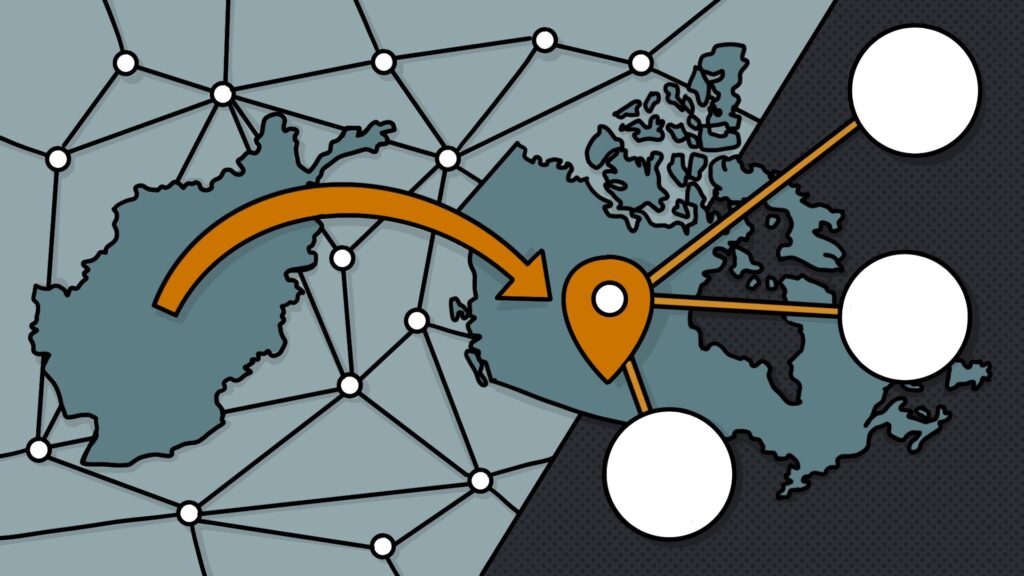
Guest blog: Navigating labour markets and information as a refugee in Canada
Listen to this article as an audio recording
Refugees in Canada encounter significant barriers to accessing labour market information (LMI), and their access varies based on the immigration stream through which they arrive. Those who arrive as refugees frequently rely on informal networks or past experiences to fill information gaps and find employment.
We also know that, in Canada, we don’t have enough information about how refugees use LMI.
LMIC recently published a report on the experiences of refugees in Canada’s labour market. To write the report, we spoke to 25 refugees from Afghanistan who sought refuge in Canada in 2021. We focused on their firsthand encounters with LMI and employment services, settlement dynamics, and the circumstances of their initial years in Canada.
The report, Refugee success in Canada’s labour market: LMI needs and gaps, presents a summary of what is known about the labour market experiences of refugees in Canada, including a case study focused on first-hand accounts from refugees themselves about the needs, gaps, barriers and opportunities they encountered when seeking LMI.
Wazhma Azizi, now a permanent resident in Canada, arrived as a refugee with this cohort from Afghanistan. An experienced researcher and program manager who had previously worked with the Free and Fair Elections Forum of Afghanistan, Wazhma joined LMIC as a research consultant on this report. She led the recruitment of participants from the Afghan community and provided insights and recommendations that helped shape the research design and methodology.
In this guest blog, Wazhma shares how LMI influenced her personal journey after she arrived in Canada as a refugee from Afghanistan.
I was born amid the chaos of war and spent my youth in the heart of conflict-ridden Afghanistan. My life's purpose became clear early on: to stand up for women's rights in a society where such advocacy was met with fierce opposition, especially from groups like the Taliban.
Despite these challenges, I dedicated myself to the cause and contributed significantly to Afghan society and politics. My story, however, took a turn when circumstances forced me to leave my homeland and seek refuge in a foreign land, Canada. This blog is about my journey from the war-torn streets of Afghanistan to the empowering avenues of Canada.
In Afghanistan, advocating for women's political rights was not just a choice. It was a necessity. The establishment of the Women's Political Rights Advocacy Group (WPRAG) stands as a testament to my resilience and determination. I faced opposition, fear and threats, but never lost my resolve. The implementation of the quota system in 2004—which mandated a minimum number of parliamentary seats for women—marked a significant milestone and increased women's representation in Afghan politics. My struggle was not just about breaking barriers. It was about shattering stereotypes and paving the way for future generations of Afghan women.
But my life took an unexpected turn when I—along with my husband, a journalist, and our young son—became refugees in Canada. Canada is known for its inclusivity and diversity, yet the transition was far from smooth. The clash between my past identity and the need to start afresh in a foreign land led to moments of self-doubt. I found myself wondering: Were all those years of education and advocacy in Afghanistan pointless?
When I arrived in Canada, I felt lost about finding a job. I didn't know how to write a resumé, where to apply for work, or even what skills were needed. Understanding Canadian work culture and getting my foreign qualifications recognized seemed so complicated. I had no idea about support services or how to connect with potential employers. It felt like trying to solve a complicated puzzle without all the pieces.
The most valuable source of labour market information for me, as a refugee, turned out to be my social networks and community. Although other resources existed, it was through these personal networks that I connected with a volunteer group that guided me in updating my resumé and creating a LinkedIn profile, provided me with personal advice, boosted my confidence, introduced me to hidden job opportunities and job search websites, helped me attend networking events, and showed me how to use online platforms. I explored every opportunity the Canadian job market had to offer.
The turning point finally came when I secured my first job. Landing it was a testament to my resilience and unwavering belief in my abilities. Each challenge I faced, every rejection I encountered, only increased my determination. I learned that resilience was not about avoiding failures, but about embracing them and emerging stronger.
My journey from a women's rights activist in Afghanistan to a professional in Canada taught me not only the importance of building a network, but the true meaning of empowerment: the ability to rise again after every fall.
Eventually, with help and persistence, I learned these important details. Now, I realize how crucial this information is for newcomers. Having clear guidance and accessible support can make a huge difference for people like me who are starting fresh in a new country.
To enhance labour market information accessibility for refugees, policy-makers and organizations should host tailored workshops, provide digital literacy programs, collaborate with community organizations, offer language support, conduct cultural sensitivity training, establish mentorship programs, create online platforms for skill development, simplify foreign qualification recognition, organize refugee-specific job fairs, and encourage flexible employment opportunities. Initiatives like these can significantly support refugees' career aspirations and integration into the workforce.
My journey from the battle-scarred landscapes of Afghanistan to the welcoming shores of Canada is a testament to the power of determination, resilience and community. Through this blog, I hope to inspire individuals facing similar challenges and remind them that every obstacle is a stepping stone toward empowerment. Together, we can overcome adversity, rewrite our stories, and create a world where every woman's voice is heard and respected.

About Wazhma Azizi
Wazhma is an experienced researcher based in Toronto, Ontario, currently working as a Research Assistant at Toronto Metropolitan University. Specializing in program development, research, and migration issues, Wazhma’s career focuses on the integration of advanced digital technologies (ADT) within the labor market.
With a Master of Public Policy and Administration from Kabul University, Wazhma’s professional journey includes roles such as a Research Consultant at the Labor Market Information Council (LMIC), where she led participant recruitment and contributed to research designs focused on the socio-economic integration of refugees. Previously,she served as the Women & Youth Outreach Officer at the Free and Fair Elections Forum of Afghanistan (FEFA), where she developed and delivered training programs, enhanced political engagement among youth, and implemented gender-sensitive policies.
In addition to her professional endeavors, Wazhma actively volunteers as a Coordinator at the New Canadian Welcome Circle with JIAS Toronto, assisting families in settling and integrating into Canadian society.
Wazhma is passionate about leveraging her background in migration research and policy analysis to contribute to projects like Bridging Divides, focusing on the integration of immigrants through ADT. Her work has been recognized with several awards, including the Employee of the Year and a citation from the Afghanistan Parliament for her human rights activities.